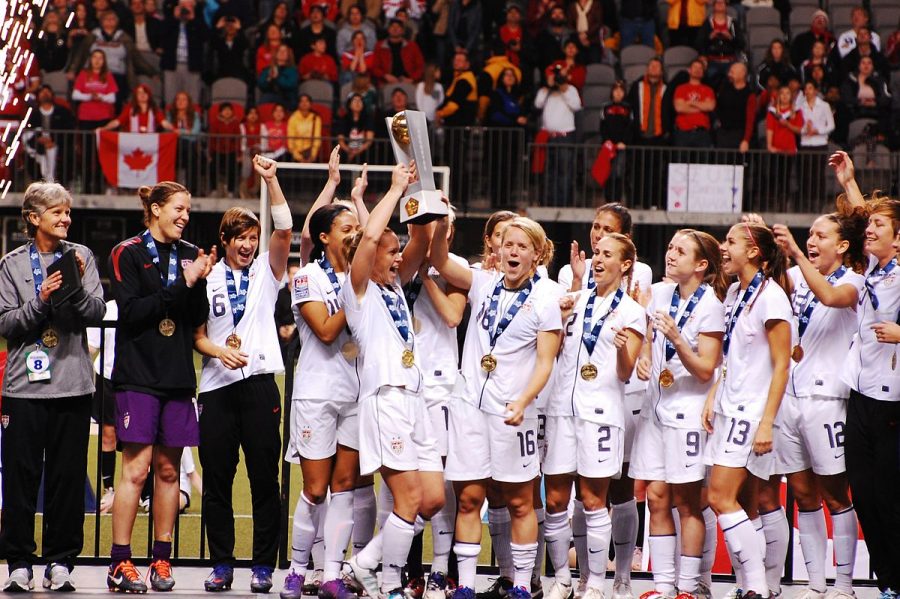Bowles: Sorry USWNT, but this is your fault
May 7, 2020
Recently, a federal judge in California rejected the lawsuit from the U.S. Women’s National Soccer Team (USWNT), ruling against them on all but one point. As much as I hate to say it, the judge was right, and there is no way to deny that the USWNT brought about their own fate.
Now hold on, don’t attack me just yet. It’s a known fact that the USWNT is a great soccer team, winning the Women’s World Cup four times while the men have never even advanced to the finals. I can name at least four women’s players, yet I don’t know a single soul on the men’s team. I genuinely feel for the female players, but despite the history of the U.S. discriminating against women, this time, there’s just none to be found.
For context, the USWNT sued the U.S. Soccer Federation for allegedly paying female players less than the male players on the Men’s National Team (USMNT). They claimed that U.S. Soccer was illegally violating the Equal Pay Act and Title VII of the Civil Rights Act of 1964. Both state that it is illegal to discriminate against employees’ pay based on gender. Important to note is that just because either gender makes more money, it is not legally discrimination if it was determined from a collective bargain.
On May 1, Judge Gary Klausner ruled that USWNT “have not demonstrated a triable issue that WNT players are paid less than MNT players.” The crazy thing? For the period of time they were suing for, the women averaged $220,747 per game (for a total of $24.5 million). The men averaged $212,639 per game in total payments (for a total of $18.5 million). Therefore, the women actually made more than the men.
Worse, this lawsuit is almost an attack on unions. Remember how it’s not discrimination if the people agreed upon a collective bargain? Well, that’s exactly the case here. The men agreed upon a collective bargaining agreement (CBA) that guarantees no base salary, only bonuses for playing games. The women agreed upon a CBA that guarantees them a $100,000 base salary but with much less lucrative bonuses.
However, they’re pointing to the fact that they would have made much more if they had the same CBA as the men’s team. But guess what? It’s their fault! That’s the agreement they wanted. If a judge were to just strike down an agreement they made with their union, the certainty of CBAs would be heavily reduced. If there are any inequities, it’s because they made a poor decision in their agreement.
Sometimes, you have to live with the consequences of your actions, but these players are claiming discrimination and gaining national attention instead of being mature about it.
Even Joe Biden tweeted that he would no longer provide World Cup funding (if elected) if U.S. soccer didn’t provide equal play. USWNT Captain Megan Rapinoe also tweeted, “We will never stop fighting for EQUALITY.” Is anyone going to tell her to stop crying over an issue her team created? If she has a problem with the “equality” of their earnings, get mad at your union for a bad agreement or yourselves for agreeing to it, but don’t make this about sexism to serve your greed.
The other concern raised by the USWNT was that they had been discriminated against by having to play more often on less safe artificial turf compared to the men’s team. However, one instance was because they played a victory tour when the men had not won and therefore played no victory tour. Are they mad for winning? And why is this U.S. Soccer’s fault? It seems reasonable that they should be happy they got to play more games and make more money.
However, Judge Klausner did not rule against them on the basis of discrimination in hotel and travel funding. The men’s team received $9 million from U.S. Soccer for airfare, but the women only received $5 million. Now here, I think we can actually see a case of discrimination. A jury is to decide the verdict on this particular issue, and it seems fairly reasonable that U.S. Soccer is at fault here.
Ultimately, the “equal pay” discrimination claims are absolutely bogus. It’s true that U.S. Soccer has a history of sexism, and it really is sad that the women aren’t getting paid as much as they could. Still, many people who are uninformed on this issue continue to claim discrimination. It’s clear that the women have not gotten the best deal, but to claim they were paid unequally when they are at fault is truly a lowly thing to do.









